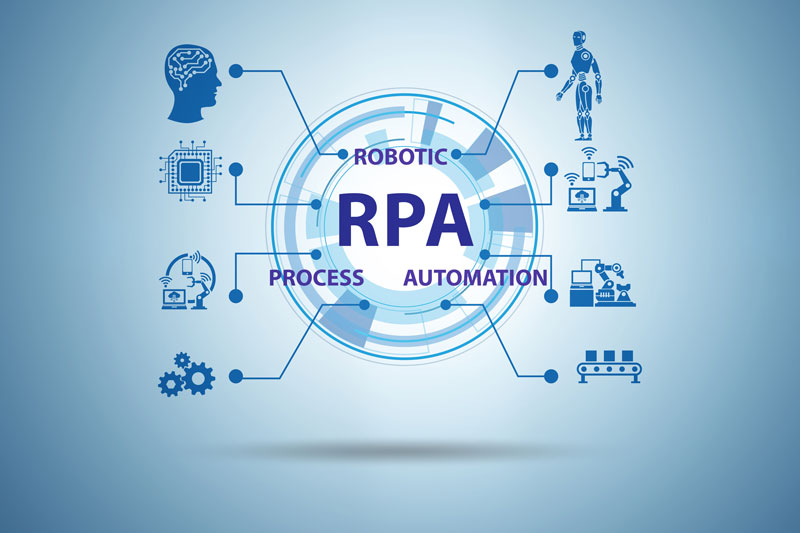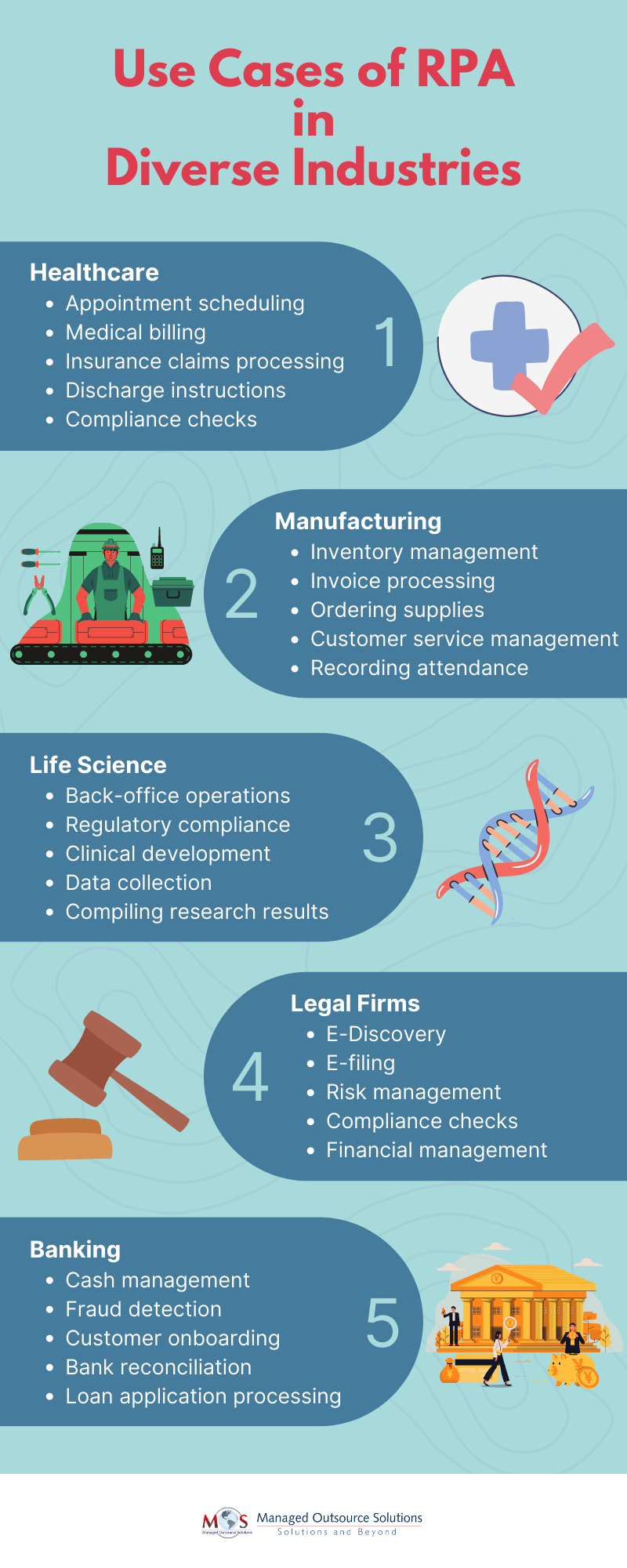In this current world, technology has developed in such a way that it can replace manpower with machines. Robotic Process Automation (RPA) is a modern technology, which incorporates business logics and structured inputs for automating business processes. A company can configure a software or robot to capture and interpret data for processing a transaction, manipulating data triggering responses, and communicating with other systems with the help of RPA.
RPA can mimic human actions through the user interface of any system. Multiple systems are involved in each business process that automates without any kind of integration to underlying systems. Thus it helps to kick start the business at low cost. RPA could range from generating automatic replies to emails to deploying hundreds and thousands of bots.
These bots can easily scale up according to the nature of the business. As it has a user-friendly approach, all types of industries including healthcare, insurance, banking life science and others have begun to incorporate it in their functioning. Business process outsourcing companies assisting various businesses are also utilizing robotic process automation for repetitive, rules-based business processes such as data entry and data extraction among many others. Let’s take a look at the industrial usage of RPA.
Use of RPA in Various Industries
- Healthcare: Healthcare is one of the prominent industries where a lot of data and tasks are generated day by day. This is one field where operational costs need to be lowered while improving patient care with high efficiency.The healthcare industry can utilize RPA in a very effective way by implementing it for front-office management, and for other tasks.Robotic Process Automation or RPA can be incorporated in the following ways:
- For scheduling patient appointments
- For medical billing
- For claiming insurance
- For improving revenue cycle management
- Improving patient record management
- Improving patient care
On the whole, RPA helps improve patient care and eliminates complexities and redundancies.
- Manufacturing: In the manufacturing industry, people need a technology that would help them to focus more on product innovations instead of engaging in critical yet mundane and repetitive tasks. In the Manufacturing scenario, RPA gains importance in the following ways.It:
- Helps reduce operational costs up to 40%
- Increase control and visibility
- Lowers downtime by increasing quality
- Improves operational agility
- Allows to upgrade the production process and business function
- Decrease manual effort
At the same time, there are certain key areas of Robotic Process Automation (RPA) in manufacturing, which include:
- Procurement
- Inventory management
- Streamlining customer communications
As a result, RPA implementation in the manufacturing industry results in:
- More efficient process visibility
- Real-time auditing
- Better and accurate decision making capability
- Life Science: RPA is currently searching for new possibilities in the field of life science. Processes such as clinical trials, consumer feedback, and tracking of adverse effects of new or existing drugs can be processed using this technology. As a result, it helps the scientists to engage their time more on developing new drugs.By using RPA, researchers can track current pharmaceutical trends to improve the development of drugs. By automating data collection process, the data can be tracked, organized and the risks and benefits of drugs can be analyzed during the process of development of drugs. By improving the data collection method, the manufacturer can lower the cost of drugs and the time can be utilized in a more effective manner.The key benefits of applying RPA in life science are:
- Streamline operations
- Compile research results
- Collect consumer feedback
- Collect data from critical trials
Robotic Process Automation (RPA) helps save time spent on doing critical yet tedious processes and thereby enables researchers to dedicate more time to developing new medicines. It helps organizations improve efficiency, modernize workflow and build more efficient workforce.
- Legal Firms: Various tasks such as drafting contracts, processing information, and making transactions are time consuming. However, RPA helps save time spent on these manual tasks and dedicate that time for your clients. It also helps in other operations such as registering trademarks, reviewing disputes, digitalizing client records, automating payments and so on.RPA implementation in legal firms will assist in speeding up their procedures and ensure efficiency and accuracy. It helps reduce costs and manpower by automating processes. The first step to take when implementing RPA is digitalizing various records.The key uses of RPA in legal firms include:
- E-discovery
- Client risk assessment
- Fee overruns reduction
- Automation of simple and repetitive tasks
- Financial management
- Compliance check
- Banking Industry: In the banking industry, RPA is used to perform repetitive tasks like data entry, automated customer service and back office tasks. It helps the employees of the bank to focus more on critical tasks while RPA takes care of mundane tasks. The benefits of RPA in the banking sector include:
- No new IT infrastructure needed
- Saves money and time
- Improves processing
- Implements digital workforce with manpower
- Improves customer experience
- Improves regulatory compliance
In the banking sector, RPA assists in customer service, payable accounts, processing credit card and mortgage, detecting frauds, processing KYC, general ledger, automating reports, process of account closure and so forth.
‘The Man in Asbestos’ is a book by Stephen Leacock published in 1911. The story revolves around the future world where a group of men made of asbestos (robots) replace human beings. In the 21st century, we are witnessing this replacement. The software technology called Robotic process Automation or RPA, working with thousands of bots, is a developing branch of technology. In other words, RPA will create revolution in this world.
On the whole, in any industry, RPA eases manpower and ensures cost-effectiveness. Apart from above-mentioned industries, other industries that can benefit from RPA are insurance, transport and logistics, utility companies and so on. In the future, we can expect manpower to be replaced with RPA in more areas as this technology is on the path of greater development. Business process outsourcing companies assisting businesses in diverse sectors are also making effective use of RPA technology.





